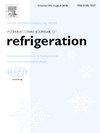小容量亚临界 R744 蒸汽压缩制冷机组各种膨胀装置的实验性能比较
IF 3.5
2区 工程技术
Q1 ENGINEERING, MECHANICAL
International Journal of Refrigeration-revue Internationale Du Froid
Pub Date : 2024-09-26
DOI:10.1016/j.ijrefrig.2024.09.015
引用次数: 0
摘要
本研究的目标是通过实验比较小容量亚临界 R744 蒸汽压缩制冷装置的三种不同膨胀装置的性能。首先考虑的膨胀装置是传统的高压膨胀阀,并将其作为基准。第二个评估的膨胀装置是用于膨胀功回收的两相喷射器,其制冷剂流量通过脉宽调制(PWM)策略进行调节。最后,采用 PWM 方法控制喷射器动力喷嘴的制冷剂流量,同时不允许喷射器吸气喷嘴吸入制冷剂。结果表明,在亚临界状态下,通过 PWM 效果控制的动机喷嘴与传统的高压膨胀阀具有相似的效果。此外,还观察到 PWM 喷射器能够有效控制高压,同时与过渡工况下的基线相比,在不使用超喂蒸发器的情况下,性能系数(COP)最高可提高 5.3%,在使用超喂蒸发器的情况下,性能系数(COP)最高可提高 7.9%。结果还表明,无需安装传统的高压膨胀阀。最后,在希腊雅典、美国凤凰城、印度新德里、沙特阿拉伯利雅得和泰国曼谷五个不同地点对上述膨胀装置的年度性能进行了评估。结果表明,与基线相比,PWM 喷射器可使年平均 COP(COPyearly avg)从 4.9%(雅典)提高到 11.8%(曼谷)。本文章由计算机程序翻译,如有差异,请以英文原文为准。
Experimental performance comparison of various expansion devices for small-capacity subcritical R744 vapour-compression refrigeration units
The target of this study is to experimentally compare the performance of three different expansion devices for small-capacity subcritical R744 vapour-compression refrigeration units. The first considered expansion device was the conventional high-pressure expansion valve, which was selected as the baseline. The second assessed expansion device was a two-phase ejector for expansion work recovery whose refrigerant flow was modulated via the pulse-width modulation (PWM) strategy. Finally, the PWM approach was employed for controlling the refrigerant flow of the ejector motive nozzle while the refrigerant was not permitted to be drawn by the ejector suction nozzle. The results showed that the motive nozzle controlled via PWM effect offers similar effectiveness to a conventional high-pressure expansion valve in the subcritical regime. Furthermore, it was observed that the PWM ejector is able to control the high pressure effectively while increasing the coefficient of performance (COP) by up to 5.3 % without and by up to 7.9 % with overfed evaporator compared to the baseline in the transition regime. The results also showed that the installation of the conventional high-pressure expansion valve is not necessary. Finally, the yearly performance of the aforementioned expansion devices was assessed in five different locations, i.e., Athens (Greece), Phoenix (USA), New Delhi (India), Riyadh (Saudi Arabia) and Bangkok (Thailand). The outcomes revealed that the PWM ejector allows for a higher in yearly average COP (COPyearly avg) from 4.9 % (in Athens) to 11.8 % (in Bangkok) over the baseline.
求助全文
通过发布文献求助,成功后即可免费获取论文全文。
去求助
来源期刊
CiteScore
7.30
自引率
12.80%
发文量
363
审稿时长
3.7 months
期刊介绍:
The International Journal of Refrigeration is published for the International Institute of Refrigeration (IIR) by Elsevier. It is essential reading for all those wishing to keep abreast of research and industrial news in refrigeration, air conditioning and associated fields. This is particularly important in these times of rapid introduction of alternative refrigerants and the emergence of new technology. The journal has published special issues on alternative refrigerants and novel topics in the field of boiling, condensation, heat pumps, food refrigeration, carbon dioxide, ammonia, hydrocarbons, magnetic refrigeration at room temperature, sorptive cooling, phase change materials and slurries, ejector technology, compressors, and solar cooling.
As well as original research papers the International Journal of Refrigeration also includes review articles, papers presented at IIR conferences, short reports and letters describing preliminary results and experimental details, and letters to the Editor on recent areas of discussion and controversy. Other features include forthcoming events, conference reports and book reviews.
Papers are published in either English or French with the IIR news section in both languages.

 求助内容:
求助内容: 应助结果提醒方式:
应助结果提醒方式:


